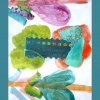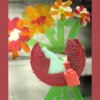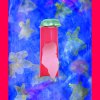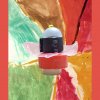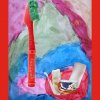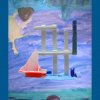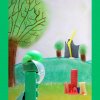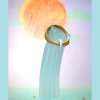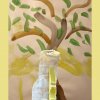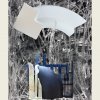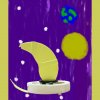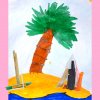Mare Plasticum - 2021
“Mare Plasticum” è il titolo di un recente rapporto redatto da International Union for Conservation of Nature and Natural Resources che approfondisce il fenomeno della presenza di plastiche nel Mar Mediterraneo. Lo stock accumulato è di oltre 1 milione di tonnellate. Il rilascio annuale si attesta intorno alle 200.000 tonnellate. L’Italia, dopo l’Egitto, è il paese che più contribuisce a questo primato. Giovanni Presutti, realizza una serie di opere assieme alle due figlie, Gemma e Flora, di nove e sei anni. Partendo da scarti di plastica rinvenuti nelle spiagge toscane ha voluto mettere in scena una favola, disegnata con le sue bambine, la cui morale sta tutta nell’importanza del riciclo. La vista su vivaci e colorati paesaggi fiabeschi è un invito al rispetto del pianeta, a un’etica prospettiva di riuso delle cose di cui ci disfiamo con sempre maggiore sufficienza, ad un atteggiamento più responsabile nei confronti dei nostri consumi.
The Mediterranean Sea, the cradle of ancient civilizations that have succeeded one another by affecting its shores. A cultural sanctuary placed "in the middle of the land" but offended by clandestine routes and, as more and more authoritative studies show, reduced to a dustbin. “Mare Plasticum” is the title of a recent report drawn up by the International Union for Conservation of Nature and Natural Resources which investigates the phenomenon of the presence of plastics in Mediterranean waters, adding further data to an already substantial scientific literature. The figures are self-explanatory. The accumulated stock is over 1 million tons. The annual leaking or release is around 200,000 tons and, given the increase in annual consumption of plastic around 4%, if there are no radical environmental policy interventions or drastic containment measures, an increase of up to 500,000 tons is estimated. Italy, after Egypt, is the country that contributes most to this primacy. Giovanni Presutti, an artist who has been involved for some time on the subject, we remember the "Plastic Islands" project with which he warns against diffuse pollution by microplastics on the Island of Elba and the Tuscan Archipelago National Park, still thunders on the subject with a series of works created together with his two daughters, Gemma and Flora, aged nine and six. What is it about? Starting from a sample of plastic scraps found on Tuscan beaches, he wanted to stage a fairy tale, drawn with his girls, whose moral lies in the importance of recycling. The view on lively and colorful fairytale landscapes is an invitation to respect the planet, to an ethical perspective of reusing the things we get rid of with increasing sufficiency, to a more responsible attitude towards our consumption. Infact, he who treats nature as a landfill is abandoning himself even before a refusal. Steve Bisson
site designed & developed by ali comunicazione
